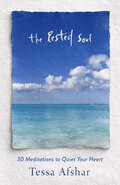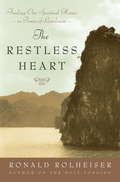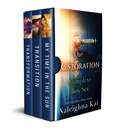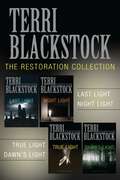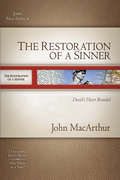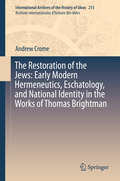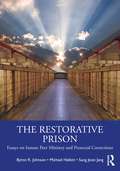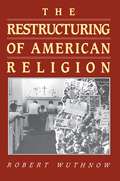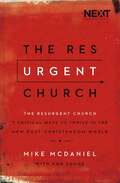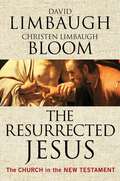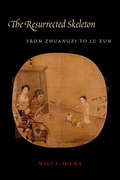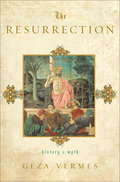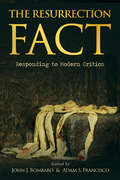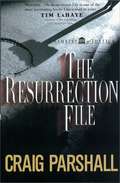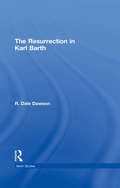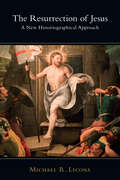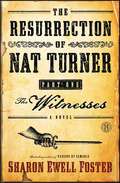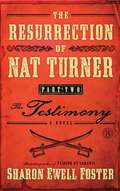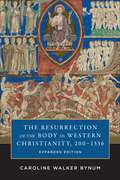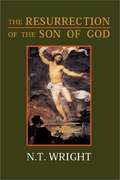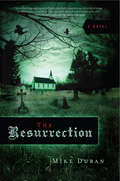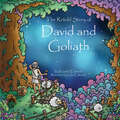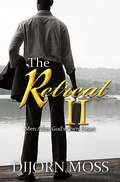- Table View
- List View
The Rested Soul: 30 Meditations to Quiet Your Heart
by Tessa AfsharTrue shalom for an anxiety-ridden world. Do you feel rested and at peace? Or are you bombarded with obstacles keeping you from true soul rest? Daily life can be a grind, full of confusion and chaos. Award-winning author and Bible teacher Tessa Afshar has been there. Drawing from the lessons she learned from battling anxiety in her own life, Tessa brings you on a journey that cultivates a rested soul. A book of 30 devotionals, The Rested Soul, includes vulnerable stories from Tessa&’s personal life—stories that will make you feel known and remind you that you are not alone. Full of inspiration found in ordinary moments, Tessa shows you how to remove the impediments that stand in the way of a quiet heart. These deep reflections are accompanied by beautiful images (photography by Tessa&’s husband). Exhale, heal, and find rest in God. Tessa&’s meditations create an oasis of calm when powerful storms of anxiety assail you. She brings you into your hope-filled, joy-infused life in Jesus. In Him, our hearts find quiet and comfort. In Him, we have favor, authority, and strength. In Jesus, we find The Rested Soul.
The Restless Flame
by Louis De WohlA stirring novel which deals reverently but realistically with the fascinating life and era of St. Augustine, one of the most remarkable men of all time.
The Restless Heart: Finding Our Spiritual Home in Times of Loneliness
by Ronald RolheiserWritten over twenty years ago, The Restless Heart was the product of a lonely young man searching for meaning to his feelings of emptiness and isolation. Powerful and autobiographical this new edition loses none of the passion and idealism of the younger writer. Indeed, Rolheiser comments in his Preface how timid we can become with maturity and how re-reading his early work he felt pride for his younger, braver self. Identifying different types of loneliness, the author reassures and challenges and frees the reader to live more meaningfully with solitude.
The Restoration Box Set
by Naleighna KaiTRANSITIONShe made one mistake. Leaving him under the cover of darkness to escape the consequences of her actions would spiral into something so horrific that it cost the innocent lives of many. What she had done was enough to put her in an early grave, but what her husband did was downright diabolical. Time after time, the women and children paid the price, when men made decisions without consulting God first. TRANSFORMATIONTamar and Amnon. He saw. He came. He conquered. And he didn’t care that she would bear the brunt of his bad choices. As a King’s son, nothing would be denied him, even though this particular experience should. Passion for him, became pain for an innocent woman. Unfortunately, that wasn’t the worst of sins in this scandal. The man who was supposed to love and protect her did nothing, forcing her brother to take deadly action that plunged the kingdom into chaos. MY TIME IN THE SUNKari Baltimore’s perfect life comes to a screeching halt when her husband's enemy stands and tells the entire congregation, "Our first lady was a fourteen-year-old prostitute …" All the sordid secrets that she’s managed to keep hidden, even from her husband, resurfaces with a vengeance when Terrence Henderson, a man who is hellbent on destroying everything they’ve built, shares her past with everyone and causes a rift that is not easily mended. Tony Baltimore makes strategic moves to protect his wife from everyone who’s coming against her—including members who are so “heavenly” minded that they’re no earthy good. When the betrayal has done too much damage to repair, and the smoke clears, no one will ever be the same
The Restoration Collection: Last Light, Night Light, True Light, Dawn's Light (A Restoration Novel)
by Terri BlackstockNew York Times bestselling suspense author Terri Blackstock weaves a masterful what-if novel in which global catastrophe reveals the darkness in human hearts—and lights the way to restoration for a self-centered world. “Blackstock is absolutely masterful at bringing spiritual dilemmas to the surface and allowing readers to wrestle with them alongside her characters.” —RT Book Reviews, 4.5 stars (of Dawn’s Light) Last Light Doug Branning’s mind raced to understand—planes were falling out of the sky, crashing, and burning? Desperation can be dangerous when a killer lives among them. Night Light Danger lurks around every corner. Now it’s inside the Brannings’ home. Survival has become a lifestyle, and technology is a thing of the past as the Branning family learns that the power outage is worldwide. Everyone is desperate. True Light As desperation rises, so does the violence. Will Mark be forced to pay for the sins of his father? Deni Branning is growing closer to Mark, and she sees him as a hero, not a traitor. She and her family set out to find the person who really pulled the trigger. But clearing Mark’s reputation is only part of the battle. Protecting him from the neighbors who ostracized him is just as difficult. Dawn’s Light Knowing the truth can be the most dangerous thing of all. As the power begins to be restored, the Brannings face their toughest crisis yet. Will God require more of them this time than they’re prepared to give?
The Restoration of a Sinner: David's Heart Revealed (MacArthur Old Testament Study Guides)
by John MacarthurMacArthur Old Testament Study Guide Series, Volume 7A Study in 2 SamuelDavid is known as Israel's greatest king, and he was renowned for his courage. But David was not a super-hero. He had to fight many difficult battles in order to establish his throne, he committed murder and adultery, and he brought disaster upon his family. Far from perfect, David was a man with sin who depended on the same grace of God that is available to us as well. Despite his all-too-human failings, the Lord declared that David was a man after God's own heart. The Restoration of a Sinner takes an in-depth look at the historical period beginning with David's struggle to establish his throne, continuing through his sin and repentance, and concluding with the tragic rebellion of his son Absalom. Studies include close-ups of Joab, Amnon, and Tamar, and others, as well as careful considerations of doctrinal themes, such as "Keeping God First" and "The Man After God's Own Heart." This twelve-volume MacArthur Old Testament Study Guide series provides intriguing twelve-week examinations of the Old Testament. Each guide looks at a portion of Scripture from three perspectives--historical studies, character studies, and thematic studies--and incorporates extensive commentary, detailed observations on overriding themes, and probing questions to help you study the Old Testament with guidance from John MacArthur.
The Restoration of the Jews: Early Modern Hermeneutics, Eschatology, and National Identity in the Works of Thomas Brightman
by Andrew CromeThis book offers the first detailed examination of the life and works of biblical commentator Thomas Brightman (1562-1607), analysing his influential eschatological commentaries and their impact on both conservative and radical writers in early modern England. It examines in detail the hermeneutic strategies used by Brightman and argues that his method centred on the dual axes of a Jewish restoration to Palestine and the construction of a strong English national identity. This book suggests that Brightman's use of conservative modes of "literal" exegesis led him to new interpretations which had a major impact on early modern English eschatology A radically historicised mode of exegesis sought to provide interpretations of the Old Testament that would have made sense to their original readers, leading Brightman and those who followed him to argue for the physical restoration of the Jews to the Holy Land. In doing so, the standard Reformed identification of Old Testament Israel with elect Christians was denied. This book traces the evolution of the controversial idea that Israel and the church both had separate unfulfilled scriptural promises in early modern England and shows how early modern exegetes sought to re-construct a distinctly English Christian identity through reading their nation into prophecy. In examining Brightman's hermeneutic strategies and their influence, this book argues for important links between a "literal" hermeneutic, ideas of Jewish restoration and national identity construction in early modern England Its central arguments will be of interest to all those researching the history of biblical interpretation, the role of religion in constructing national identity and the background to the later development of Christian Zionism. This important study provides a new examination of Thomas Brightman's hermeneutical method, particularly his ideas on the restoration of the Jews. The author's thorough analysis of Brightman's approach also has more general and wider implications for understanding the development of English apocalyptic interpretation into the later seventeenth-century. ' - Dr Warren Johnston, Associate Professor of History, Algoma University. Andrew Crome's ground-breaking study of Thomas Brightman offers a new and sometimes surprising account of the development of millennial thinking in and beyond early modern England. This masterly account demonstrates the extent to which an emerging Zionism supported an emerging English nationalism, while outlining the historical roots of some of the most important of contemporary geopolitical themes. " - Professor Crawford Gribben, Professor of Early Modern British History, Queen's University Belfast. This important study provides a new examination of Thomas Brightman's hermeneutical method, particularly his ideas on the restoration of the Jews. The author's thorough analysis of Brightman's approach also has more general and wider implications for understanding the development of English apocalyptic interpretation into the later seventeenth-century. ' - Dr Warren Johnston, Associate Professor of History, Algoma University.
The Restorative Prison: Essays on Inmate Peer Ministry and Prosocial Corrections
by Michael Hallett Byron R. Johnson Sung Joon JangDrawing on work from inside some of America’s largest and toughest prisons, this book documents an alternative model of "restorative corrections" utilizing the lived experience of successful inmates, fast disrupting traditional models of correctional programming. While research documents a strong desire among those serving time in prison to redeem themselves, inmates often confront a profound lack of opportunity for achieving redemption. In a system that has become obsessively and dysfunctionally punitive, often fewer than 10% of prisoners receive any programming. Incarcerated citizens emerge from prisons in the United States to reoffend at profoundly high rates, with the majority of released prisoners ending up back in prison within five years. In this book, the authors describe a transformative agenda for incentivizing and rewarding good behavior inside prisons, rapidly proving to be a disruptive alternative to mainstream corrections and offering hope for a positive future. The authors’ expertise on the impact of faith-based programs on recidivism reduction and prisoner reentry allows them to delve into the principles behind inmate-led religious services and other prosocial programs—to show how those incarcerated may come to consider their existence as meaningful despite their criminal past and current incarceration. Religious practice is shown to facilitate the kind of transformational "identity work" that leads to desistance that involves a change in worldview and self-concept, and which may lead a prisoner to see and interpret reality in a fundamentally different way. With participation in religion protected by the U.S. Constitution, these model programs are helping prison administrators weather financial challenges while also helping make prisons less punitive, more transparent, and emotionally restorative. This book is essential reading for scholars of corrections, offender reentry, community corrections, and religion and crime, as well as professionals and volunteers involved in correctional counseling and prison ministry.
The Restructuring of American Religion: Society and Faith since World War II (Studies in Church and State #2)
by Robert WuthnowThe description for this book, The Restructuring of American Religion: Society and Faith since World War II, will be forthcoming.
The Resurgent Church: 7 Critical Ways to Thrive in the New Post-Christendom World
by Mike McdanielFor the first time in centuries, the Church no longer has a primary place in the cultural dialogue. Christian leaders living off old assumptions are struggling, while missional churches are discovering new ways to reinvent themselves, arrest the general decline, and become catalysts for new strategies for reaching non-believers. These new voices are are following the lead of the early church, shifting their focus to a missional model. The Resurgent Church will help church leaders who are struggling to find and incorporate this new paradigm into their local church body.
The Resurrected Jesus: The Church in the New Testament
by David Limbaugh Christen Limbaugh Bloom#1 nationally best-selling author of Jesus is Risen and Jesus on Trial returns with his coauthor and daughter for the final installment in his hugely popular Jesus series, challenging the modern church to reexamine the compelling testimony of early Christians. Limbaugh, a believing lawyer and brother of the late great Rush Limbaugh, and Christen Limbaugh Bloom engage history and logic to develop deeper understanding and stronger faith in the divinity of Christ, the resurrection, and the life everlasting Jesus promises.The Resurrected, Conquering Jesus In the fifth and final installment of his bestselling Jesus series, David Limbaugh digs into the New Testament epistles with passion and imagination, showing that the testimony of Jesus&’ earliest followers provides irrefutable proof of His resurrection. Inspired by God and penned by the apostles, the epistles were written to the first Christians to proclaim the divinity of Christ and to encourage them to persevere through persecution, famine, sickness, and doubt. On a lawyerly quest for truth, Limbaugh looks behind these biblical texts, exploring the lives of their authors, who included some of those closest to the Lord—his most intimate friends, Peter and John, and his own kinsmen James and Jude. The result is an unforgettable encounter with Jesus. The Resurrected Jesus speaks to the struggles the church faces today, strengthening believers and challenging doubters with the eyewitness accounts of the messengers who travelled far and wide to proclaim the resurrected Christ.
The Resurrected Skeleton: From Zhuangzi to Lu Xun (Translations from the Asian Classics)
by Wilt IdemaThe early Chinese text Master Zhuang (Zhuangzi) is well known for its relativistic philosophy and colorful anecdotes. In the work, Zhuang Zhou ca. 300 B.C.E.) dreams that he is a butterfly and wonders, upon awaking, if he in fact dreamed that he was a butterfly or if the butterfly is now dreaming that it is Zhuang Zhou. The text also recounts Master Zhuang's encounter with a skull, which praises the pleasures of death over the toil of living. This anecdote became popular with Chinese poets of the second and third century C.E. and found renewed significance with the founders of Quanzhen Daoism in the twelfth century.The Quanzhen masters transformed the skull into a skeleton and treated the object as a metonym for death and a symbol of the refusal of enlightenment. Later preachers made further revisions, adding Master Zhuang's resurrection of the skeleton, a series of accusations made by the skeleton against the philosopher, and the enlightenment of the magistrate who judges their case. The legend of the skeleton was widely popular throughout the Ming dynasty (1368–1644), and the fiction writer Lu Xun (1881–1936) reimagined it in the modern era. The first book in English to trace the development of the legend and its relationship to centuries of change in Chinese philosophy and culture, The Resurrected Skeleton translates and contextualizes the story's major adaptations and draws parallels with the Muslim legend of Jesus's encounter with a skull and the European tradition of the Dance of Death. Translated works include versions of the legend in the form of popular ballads and plays, together with Lu Xun's short story of the 1930s, underlining the continuity between traditional and modern Chinese culture.
The Resurrection
by Geza VermesThe story of Christ's crucifixion and subsequent resurrection is the rock of faith on which Christianity is founded. But on what evidence is the most miraculous phenomenon in religious history based? World-famous Biblical scholar Geza Vermes has studied all the evidence that still remains, over two thousand years after Jesus Christ was reported to have risen from the dead. Examining the Jewish Bible, the New Testament and other accounts left to us, as well as contemporary attitudes to the afterlife, he takes us through each episode with a historian's focus: the crucifixion, the treatment of the body, the statements of the women who found the empty tomb, and the visions of Christ by his disciples. Unravelling the true meaning conveyed in the Gospels, the Acts and St Paul, Vermes shines new light on the developing faith in the risen Christ among the first followers of Jesus.
The Resurrection Fact: Responding to Modern Critics
by Adam S Francisco John J BombaroIn the first century, the resurrection fact faced both Jewish and Greek audiences with a challenge, the challenge of a new reality: Christ, the risen Lord. Since facts are by definition"something that happened" and this happening was witnessed, proclaimed, and recorded, the fact stands for all generations.In answering critics, a defense of the resurrection consists not only of a response by way of negation (e.g., Christianity is not this), but also through positive affirmations (this is Christianity). In this book, the reader will find both. However, it is our hope that the final word retained would be the one that stands for something rather than against something.Together, our words stand for something positive, not negative namely the good news that the one true God has now taken charge of the world, in and through Jesus and His death and resurrection.
The Resurrection File (Chamber of Justice Series, #1)
by Craig ParshallWhen a preacher asks attorney Will Chambers to defend him against accusations that could discredit the gospels, Will's unbelieving heart says run. But conspiracy and intrigue draw him deep into the case...and closer to Christ.
The Resurrection in Karl Barth (Barth Studies)
by R. Dale DawsonKarl Barth repeatedly spoke of the centrality and unparalleled significance of the resurrection of Jesus Christ for his theological understanding, yet a clear grasp of its nature and scope in Barth continues to find little expression in scholarly literature. This book seeks to draw out the theological substance and systematic implications of Barth's thinking on this theme. Barth's mature understanding of the resurrection concentrates upon the transition from the objective achievement of reconciliation culminating in the crucifixion and death of Jesus Christ to its subjective appropriation in the life of the believer, all within a thoroughly christological context. The resurrection may be described as the way of the crucified Lord to others, and is, for Barth, the essential and efficient link between christology proper and the extension of Christ's saving work to others.
The Resurrection of Jesus: A New Historiographical Approach
by Michael R. LiconaThe question of the historicity of Jesus' resurrection has been repeatedly probed, investigated and debated. And the results have varied widely. Perhaps some now regard this issue as the burned-over district of New Testament scholarship. Could there be any new and promising approach to this problem? Yes, answers Michael Licona. And he convincingly points us to a significant deficiency in approaching this question: our historiographical orientation and practice. So he opens this study with an extensive consideration of historiography and the particular problem of investigating claims of miracles. This alone is a valuable contribution. But then Licona carefully applies his principles and methods to the question of Jesus' resurrection. In addition to determining and working from the most reliable sources and bedrock historical evidence, Licona critically weighs other prominent hypotheses. His own argument is a challenging and closely argued case for the historicity of the resurrection of Jesus, the Christ. Any future approaches to dealing with this "prize puzzle" of New Testament study will need to be routed through The Resurrection of Jesus.
The Resurrection of Nat Turner, Part 1: A Novel
by Sharon Ewell FosterThe truth has been buried more than one hundred years . . . Leading a small army of slaves, Nat Turner was a man born with a mission: to set the captives free. When words failed, he ignited an uprising that left over fifty whites dead. In the predawn hours of August 22, 1831, Nat Turner stormed into history with a Bible in one hand, brandishing a sword in the other. His rebellion shined a national spotlight on slavery and the state of Virginia and divided a nation’s trust. Turner himself became a lightning rod for abolitionists like Harriet Beecher Stowe and a terror and secret shame for slave owners. In The Resurrection of Nat Turner, Part 1: The Witnesses, Nat Turner’s story is revealed through the eyes and minds of slaves and masters, friends and foes. In their words is the truth of the mystery and conspiracy of Nat Turner’s life, death, and confession. The Resurrection of Nat Turner spans more than sixty years, sweeping from the majestic highlands of Ethiopia to the towns of Cross Keys and Jerusalem in Southampton County. Using extensive research, Sharon Ewell Foster breaks hallowed ground in this epic novel, revealing long-buried secrets about this tragic hero.
The Resurrection of Nat Turner, Part 2: A Novel
by Sharon Ewell FosterThe sequel to The Resurrection of Nat Turner, Part I: The Witnesses shows the story of Nat Turner through his own eyes, from growing up a slave through his violent uprising and death. In the predawn hours of August 22, 1831, slave Nat Turner stormed into history with a Bible in one hand and a sword in the other. Leading a small army of fellow slaves in an uprising that left more than fifty whites dead, Turner became a tragic hero and a lightning rod for abolitionists. His rebellion put Virginia in the national spotlight and tore a nation's trust. In Part I: The Witnesses, Harriet Beecher Stowe encounters a mysterious runaway slave who recounts stories of people who knew Nat Turner, both friends and enemies. In their words are the truth of the mystery and conspiracy of Turner's life, death, and confession. Part 2: The Testimony, relates the whole story--from Turner's early slave years with his Ethiopian-born mother through the uprising, his trial, and hanging--from Nat's perspective. It's a story full of greed and betrayal, faith and courage, villains and heroes.
The Resurrection of Nat Turner, Part 2: The Testimony
by Sharon E FosterThey were all heroes . . . Sparked by an indigo sun, Nat Turner stormed into history with a sword in one hand and a Bible in the other. Thirty years before the advent of the Civil War--in the predawn hours of August 22, 1831, commanding a small army of slaves, Nat Turner led a bloody fight for freedom that shined a national spotlight on slavery and left more than fifty whites dead. In The Resurrection of Nat Turner, Part 2: The Testimony, as Harriet Beecher Stowe seeks to learn the truth of the man his people called Prophet, Nat Turner shares the faith, triumph, tragedy, and hope of his fight for liberty, brotherhood, and self-determination. For 180 years, the truth of Nat's story has been tainted. Award-winning author Sharon Ewell Foster reinterprets history to offer a new American story of one man's struggle for freedom and the redemption of his people. Based on actual trial records, interviews with descendants, official documents, and five years of research, The Resurrection of Nat Turner, Part 2: The Testimony is a story of the quest for truth and the true meaning of liberty.
The Resurrection of the Body in Western Christianity, 200–1336 (American Lectures on the History of Religions #No. 15)
by Caroline Walker BynumA classic of medieval studies, The Resurrection of the Body in Western Christianity, 200–1336 traces ideas of death and resurrection in early and medieval Christianity. Caroline Walker Bynum explores problems of the body and identity in devotional and theological literature, suggesting that medieval attitudes toward the body still shape modern notions of the individual. This expanded edition includes her 1995 article “Why All the Fuss About the Body? A Medievalist’s Perspective,” which takes a broader perspective on the book’s themes. It also includes a new introduction that explores the context in which the book and article were written, as well as why the Middle Ages matter for how we think about the body and life after death today.
The Resurrection of the Son of God (Christian Origins and the Question of God, Volume #3)
by N. T. WrightThe third in N.T. Wright's series Christian Origins and the Question of God, this book sketches a map of ancient beliefs about life after death, in both the Greco-Roman and Jewish worlds.
The Resurrection: A Novel
by Mike DuranIn the graveyard overlooking the city of Stonetree, a petrified oak broods. It’s a monstrous thing, not just because of its size, but because of who was murdered there. When Ruby Case limped into church that spring morning, she was not thinking about haunted trees. Mother of two young boys and wife to a backslidden believer, she faithfully prays for God’s visitation upon the city. Yet when she inexplicably raises a boy from the dead, Ruby gets more than she bargained for. The resurrection creates uproar in the quiet coastal town, turning Ruby into both a celebrity and a scapegoat. When Reverend Ian Clark joins Ruby in a search for answers it leads to a collision with unspeakable darkness. Together, they quickly realize that Ruby woke more than a dead boy, and the secrets she unleashed now threaten to destroy them all. Can they overcome their own brokenness before they become victims of an insidious evil?
The Retold Story of David and Goliath
by Rosalind EdwardsThis book retells the beloved biblical story of David, the young shepherd who bravely faced and defeated the fearsome Philistine giant, Goliath. David, a boy of tremendous faith, stands alone against this enormous foe, believing in the power and might of his God, while the entire army of Israel quivers in fear.This beautiful, triumphant story is written by Rosalind Edwards, a lover of everything biblical, and passionate about teaching children the truth of the bible and the mind-blowing power and love of God. It is written in rhyming verse to make the reading a fun, memorable, and happy event.Reader and listener are both taken on a journey of biblical history and will see this story of faith and victory in a uniquely real and inspiring way. Children of all ages and their adults will be challenged to put their faith anew in the King of kings and Lord of lords.Luke Edwards has once again put his wonderful artistic talent into the illustrations – capturing the real-life story of the David vs Goliath battle, in a way that will enthral and motivate the young.
The Retreat 2: Men After God's Own Heart
by Dijorn MossThe Four Brothers of God are back! Quincy, Chauncey, Jamal, and Will have become inseparable as a result of last year's men's retreat, but will the very same event that brought them together be the event that drives them apart? Quincy and Karen have come a long way since the affairs that nearly cost their marriage, but will their daughter's sudden departure from school drive their marriage to the brink? Chauncey is determined to find a wife, but his exploration of online dating and the social networks just might lead him astray. Chantel and Jamal have postponed their wedding to enroll in premarital counseling, but as old issues resurface, they are questioning whether they have made the right decision. Finally, Will is fighting desperately to gain custody of his younger brother. Will he be able to save his brother from a toxic environment? Once again these men are at a crossroads and will have to lean on God and each other to survive; but instead, they just might allow pride to drive a wedge between them.
